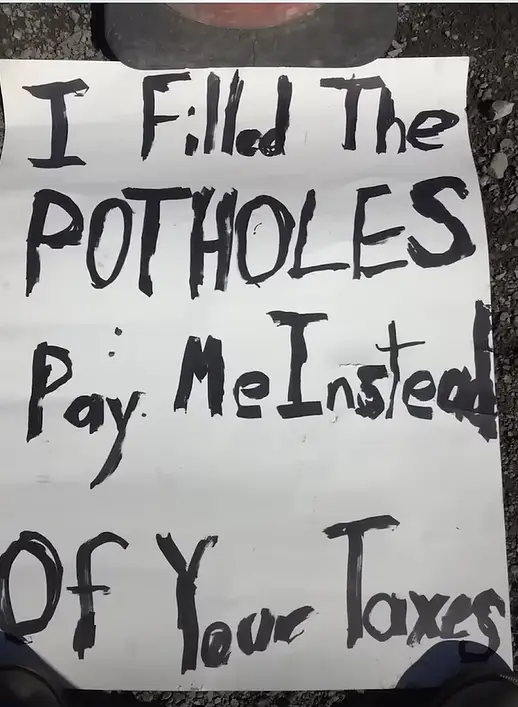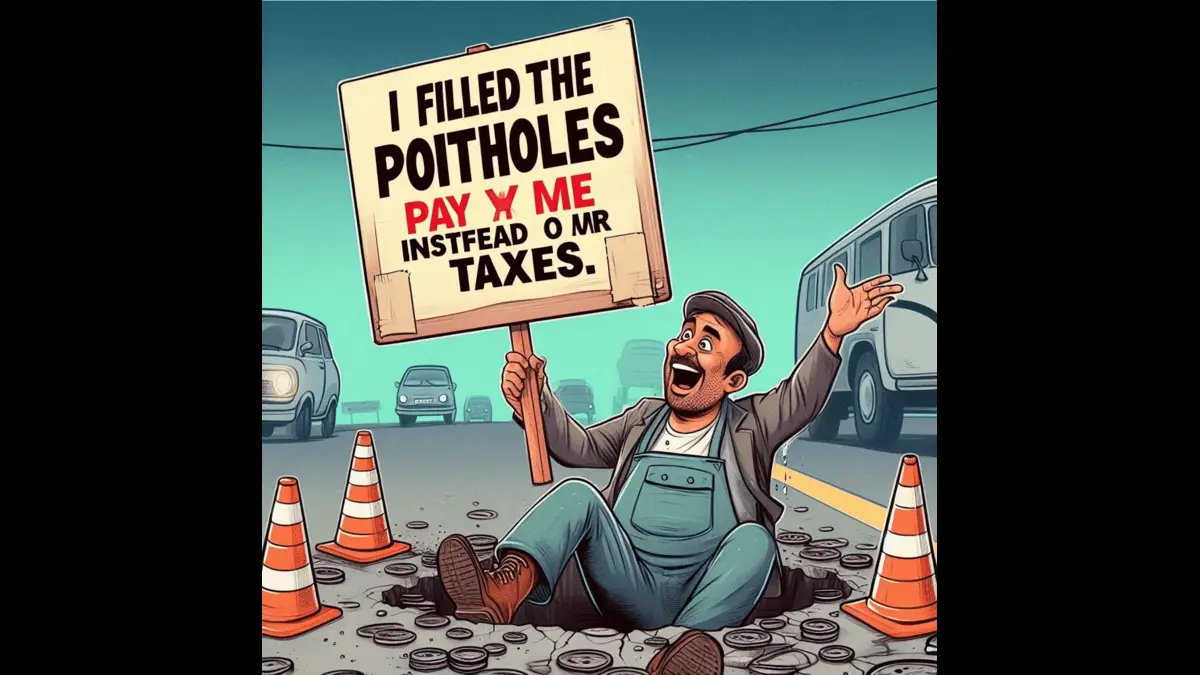Canadian Man Potholes Story: A Canadian man named John McHugh became so frustrated with the potholes in Nova Scotia that he began filling them himself with a sign that read, “I filled the potholes; pay me instead of your taxes.” John got the idea to begin filling potholes when he was out for a drive with his mother, and they hit a large pothole. So, John grabbed a snow shovel and began collecting gravel from the side of the road and flinging it from a distance into the potholes on the highway.

He then waited for a car to pass and tamp the gravel down, and then he would throw another scoop at the hole. Drivers were thrilled, stopping to give John coffee, cash, and joints as a thank you for his hard work. But the police were not so impressed. First, they told him he was impeding traffic. Then they said it was dangerous for him to be so close to the highway, also telling him it’s a criminal offense to alter public roadways.
But John didn’t care, and he was back the following day to finish the work he had started. When asked what he would do with the money drivers had given him, he said he was starting a new job out west and would use the money to cover travel and living expenses. He then changed his mind and said, “Not gonna lie, I’m probably gonna buy weed with it.”

also read : Why Kung Fu Panda Success Sparks a National Debate in China?
Detail Story of Canadian Man Pathole :
The Frustrations of a Driver: A Pothole Encounter
The experience of driving on poorly maintained roads often transforms an ordinary task into an exercise in frustration. John McHugh and his mother are a representation of many motorists who have encountered the precarious nature of driving on degraded surfaces. One fateful day, while navigating through the streets of Nova Scotia, they found themselves facing not just an average pothole, but a significant one that ultimately compromised the integrity of their vehicle.
As they traveled along a familiar route, the sudden jolt of the car hitting the pothole was both shocking and damaging. The impact reverberated through the vehicle, resulting in a distressing sound and a feeling of vulnerability. This incident illuminated the larger issue many drivers face: the struggle against deteriorating infrastructure, which can lead to unexpected expenses such as repairs and alignments. Statistics indicate that millions of dollars are spent every year due to car damages caused by potholes, underscoring the urgency of addressing this prevalent issue.
This encounter transcended being a mere inconvenience for John McHugh; it became a catalyst for action. Frustration transformed into motivation, spotlighting a critical aspect of community engagement. As he pondered the lack of attention given to road maintenance, he recognized a broader sentiment shared among local drivers—an increasing ire towards the state of their roads. This realization sparked within him the resolve to tackle the problem head-on, embarking on an unconventional path as a self-appointed pothole vigilante.
John’s story captures the nuances of a common struggle faced by many citizens, illustrating how the daily grind of driving can lead to innovative solutions when confronted with adversity. His journey emphasizes a need for action and advocacy in response to the challenges posed by neglected road conditions.
The Pothole Filling Process: A DIY Approach
John McHugh has employed a unique, hands-on method to address the ever-present issue of potholes in his community. With a distinctive set of tools — primarily a standard snow shovel — he has turned into a local pothole vigilante, tackling the problem with ingenuity and a sense of humor. His approach is as much about community engagement as it is about road repair. The materials he uses are often sourced directly from the roadside, showcasing a casual yet effective take on DIY pothole filling.
As he ventures out with his trusty shovel, McHugh adopts a systematic approach to his makeshift repairs. Typically, he begins by gathering gravel or rubble that can effectively fill the crater-like depressions in the asphalt. This resourcefulness not only reduces the need for professional assistance but also exemplifies a community-driven effort toward improving local infrastructure. His method of waiting for cars to pass demonstrates a mix of caution and consideration, ensuring the safety of both himself and the drivers passing by.
Once the area is clear, McHugh eagerly lays the collected material into the pothole. To ensure the gravel is packed down securely, he goes as far as to leverage his own body weight and brings along a few other household items to tamp down the fill. Witnesses have often described this process as an amusing spectacle, as passersby frequently stop to engage with him, offering words of encouragement or joining in the effort. This informal yet concerted action not only highlights the creativity involved in DIY solutions but also fosters a sense of community, with individuals recognizing the importance of maintaining their shared spaces.
In promoting such a grassroots initiative, John McHugh embodies the spirit of community-driven change, inviting others to take an active role in enhancing their environment through simple yet effective measures. The charm and humor of his pothole-filling escapades have become an endearing characteristic of the local landscape in Nova Scotia.
Community Response: Support, Coffee, and Cash
As John McHugh embarked on his mission to tackle the persistent pothole problems in Nova Scotia, the community’s reaction was nothing short of heartwarming. Local residents and drivers quickly began to notice his efforts to fill in those troublesome road depressions, and many felt compelled to show their appreciation. Support came in various forms, from simple gestures of kindness such as offering him a warm cup of coffee, to more generous contributions that included cash donations aimed at furthering his grassroots activism.
Not only did these small exchanges foster a sense of camaraderie among drivers and pedestrians alike, but they also highlighted the collective desire for safe and well-maintained roadways. The vocal support from the community resonated across social media platforms, where residents shared anecdotes and photographs documenting their encounters with McHugh as he worked tirelessly to improve local roads. As a result, his initiative garnered attention beyond just one neighborhood, inspiring others to take similar actions in their own areas.
This form of grassroots activism cultivated a stronger bond among community members. It demonstrated how ordinary citizens could play a pivotal role in addressing the shortcomings of local infrastructure, often feeling empowered by the tangible change that they could effectuate. As McHugh filled potholes, he inadvertently created a hub of community interaction, where people would stop to chat, share their own pothole woes, or even suggest areas that needed immediate attention. Such engagement not only made MacHugh’s task a little lighter but also shifted perspectives on community responsibility.
The remarkably supportive atmosphere around McHugh’s efforts served as a reminder that collective action—however small—can lead to significant improvements in community wellbeing. Many residents began to realize that taking initiative in local matters could inspire change, catalyzing a more robust sense of community and collective responsibility. All these interactions underscored the idea that while potholes might physically divide roads, acts of kindness and solidarity could effectively bridge gaps in the community.
Legal Troubles and John’s Commitment to Change
The journey of John McHugh, a self-proclaimed pothole vigilante in Nova Scotia, has not been without its challenges. His commitment to fill potholes and improve road safety was met with legal scrutiny from law enforcement. Authorities raised concerns about the safety and legality of his activities, emphasizing that undertaking such work without proper permissions could lead to severe ramifications. Despite these warnings, John remained undeterred, demonstrating a strong commitment to the cause and the community. He firmly believed that the bureaucratic processes often slowed down necessary changes and that he could make a difference more swiftly than the local government.
John’s passionate approach to civic engagement came with a humorous twist. He often recounted his tongue-in-cheek remarks regarding the money he collected to fund his pothole repairs. “Maybe I’ll build a castle with all this money I’ve saved from pothole-filling!” he joked during a community meeting. This light-hearted response showcased his personality and ability to maintain humor in the face of adversity, while also shedding light on the challenges many activists face when attempting to bring about change. His approach highlighted the tensions between citizen-led initiatives and governmental authority, often leading to poignant discussions within the community as to what constitutes responsible civic engagement.
Through his endeavors, John McHugh has ignited conversations concerning road safety and local governance, illuminating the critical role citizens play in advocating for better infrastructure. His experiences point to broader themes around activism, the hurdles faced when challenging the status quo, and the balance between individual initiative and legal frameworks. These interactions underscore the complexities of the relationship between citizens and government entities, ultimately driving home John’s unwavering dedication to effecting change in his community.
pathole, patholes









